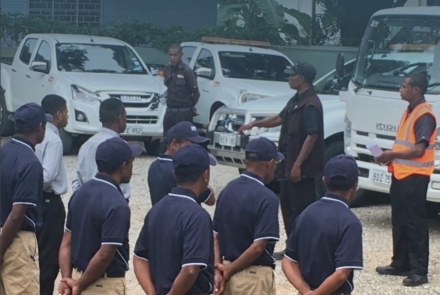
PNG’s private security industry could improve public security: report
A new report from researchers at The Australian National University (ANU) highlights the vital role private security plays in ensuring public security across Papua New Guinea (PNG).
Private Security in Papua New Guinea – A Networked Approach shows that while the industry is in need of much greater regulation, PNG would likely face worse problems of insecurity than it currently does without the private security sector.
The report is authored by Associate Professor Sinclair Dinnen from the ANU Department of Pacific Affairs and Dr Grant Walton from the ANU Development Policy Centre.
According to the researchers, while consistent with global trends, the dramatic growth of the private security industry in recent years has attracted surprisingly little attention among decision-makers in either PNG or Australia. This is despite PNG’s well-known problems of violent crime and Australia’s significant relationship with its northern neighbour.
Associate Professor Dinnen said an important starting point for policymakers is to acknowledge the key role already the industry already plays in PNG. This includes the local employment opportunities it provides, with some claiming it’s the third largest source of employment in PNG.
“At present, private security is largely absent or invisible in policy discussions about security in PNG – it simply doesn’t feature,” Associate Professor Dinnen said.
“This applies equally to Australian discussions about security in PNG, which tend to focus on state agencies like the police and defence force.
“Australia, PNG’s leading international donor and security partner, needs a much better understanding of how security provision actually works in our nearest neighbour. The industry is a critical part of a broader network of security actors that includes the police and a wide variety of local actors.
“We hope this report will lead to a better understanding of private security in PNG and, in particular, how it relates to and interacts with other security providers, including the police, NGOs, local communities, and the corporate sector.”
The report notes that the private security industry is a particularly important player given major shortfalls in public trust and confidence in PNG’s police force, the RPNGC.
Associate Professor Dinnen said that while private security companies focus on protecting the assets and persons of their paying clients, some are also in a position complement the work of the public police.
“PNG’s crime, law and order problems are complex and not amenable to quick or easy solutions. Improving the capabilities of the RPNGC and, where appropriate, increasing cooperation between police and some security companies, is one part of the solution,” he said.
However, the researchers also recognise the industry’s limitations and note concerns about how elements within it can undermine security, and even, in a few cases, perpetuate insecurity.
“We acknowledge that the private security industry has its problems; however as one of the most dominant players in PNG’s security landscape, we need to acknowledge its potential for helping address insecurity,” Dr Walton said.
“This report provides some initial insights into how this might be achieved. In this regard, effective regulation of the industry is absolutely essential and this is another area where Australia can make an important contribution.”
The research for the report was sponsored by the Australian Government through the Australian Civil-Military Centre.
Updated: 22 November 2024/Responsible Officer: Crawford Engagement/Page Contact: CAP Web Team












